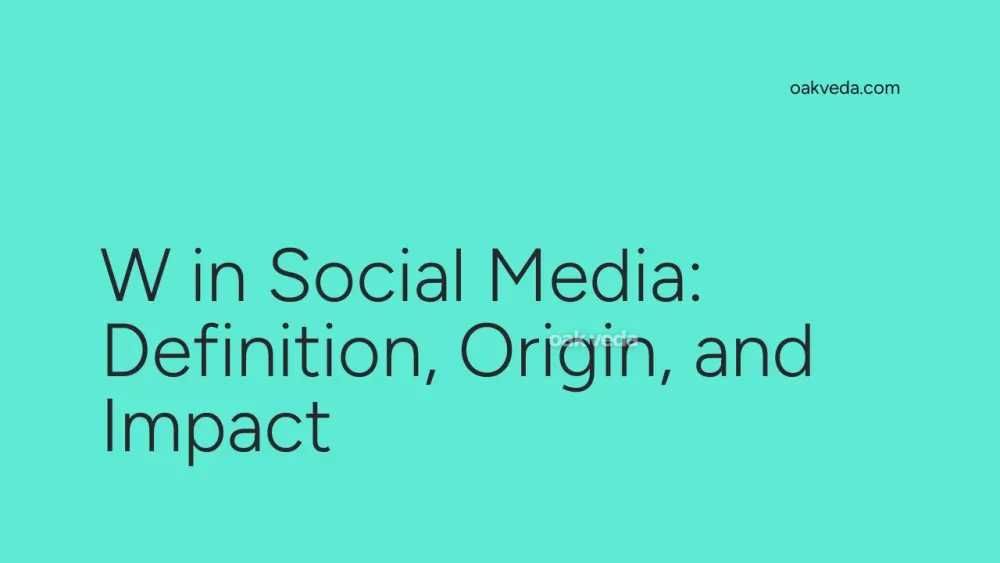
What is W in Social Media?
In the fast-paced world of social media, "W" has emerged as a popular slang term representing "win" or "victory." This shorthand expression is widely used across various platforms to celebrate successes, achievements, or positive outcomes. Whether it's a personal triumph, a team victory, or a favorable turn of events, "W" has become a quick and efficient way to express joy and accomplishment in the digital realm.
Origin and Development of W
The use of "W" as an abbreviation for "win" likely originated from sports terminology, where wins and losses are often recorded as "W" and "L" respectively. As internet culture evolved and the need for brevity in online communication grew, this shorthand naturally found its way into social media conversations.
The exact timeline of when "W" became prevalent in social media is difficult to pinpoint, but its usage has significantly increased over the past decade. The term gained traction alongside the rise of Twitter, where character limits encouraged users to adopt concise expressions.
How W Works in Social Media
Using "W" in social media is straightforward and versatile. It can be employed in various contexts:
- As a standalone response: "W"
- In a sentence: "That's a huge W!"
- In hashtag form: "#W" or "#BigW"
- Repeated for emphasis: "WWWWW"
The term is often used reactively, as a quick response to good news or positive developments. Its simplicity allows for rapid communication of approval or celebration, making it ideal for fast-moving social media conversations.
Popular Examples of W Usage
"W" has become ubiquitous across social media platforms. Here are some common scenarios where you might encounter it:
- Sports fans celebrating their team's victory: "Our team just won the championship! W!"
- Gamers acknowledging a successful play: "Clutched the 1v5 situation. W."
- Students sharing exam results: "Passed all my finals. Massive W!"
- Career achievements: "Got the job offer I wanted. W season!"
- Personal milestones: "Finally moved into my own place. Big W!"
Impact of W on Social Media Culture
The widespread adoption of "W" reflects broader trends in online communication:
-
Brevity: In a world of information overload, concise expressions like "W" allow users to convey emotions quickly.
-
Community building: Using shared language like "W" fosters a sense of belonging among social media users.
-
Positivity promotion: The term encourages users to celebrate wins, potentially contributing to a more positive online environment.
-
Meme culture: "W" has become part of internet meme culture, often used ironically or in exaggerated contexts.
-
Cross-platform usage: The term's simplicity allows it to be easily adopted across different social media platforms.
How Brands and Influencers Use W
Savvy brands and influencers have incorporated "W" into their social media strategies to connect with audiences:
- Engagement boosting: Brands might use "W" to celebrate product launches or company milestones, inviting followers to share in the excitement.
- Relatable content: Influencers often use "W" to make their content feel more authentic and in tune with their audience's language.
- Campaign hashtags: Some marketing campaigns incorporate "W" into hashtags to create buzz around promotions or events.
- Customer interaction: Brands may respond to positive customer feedback with "W," showing they're in touch with social media trends.
Future Trends Related to W
As social media continues to evolve, we can expect the usage of "W" to adapt:
- Visual representations: Emojis or custom graphics representing "W" might become more prevalent.
- Platform-specific features: Social media platforms could introduce "W" reactions or stickers.
- AI and chatbots: As AI becomes more sophisticated, chatbots might incorporate "W" to sound more natural in interactions.
- Localization: The term may be adapted or translated as it spreads to non-English speaking online communities.
FAQs about W in Social Media
Q: Is "W" only used by younger social media users? A: While it's particularly popular among younger users, "W" has been adopted across various age groups on social media.
Q: Can "W" be used sarcastically? A: Yes, like many slang terms, "W" can be used ironically to highlight failures or disappointments.
Q: Are there variations of "W" used in social media? A: Yes, variations include "Big W," "Huge W," and "W's in the chat" (often used in live streaming).
Q: How does "W" compare to other positive slang terms? A: "W" is similar to terms like "FTW" (For The Win) but is generally considered more current and versatile.
Q: Is it appropriate to use "W" in professional online contexts? A: While common in casual social media use, it's best to avoid "W" in formal professional communications unless the context is very relaxed.
In conclusion, "W" has become a significant part of social media language, offering users a quick and effective way to express positivity and celebrate successes. As online communication continues to evolve, "W" stands as a testament to the creative and adaptive nature of internet culture. Whether you're a casual social media user, a content creator, or a brand looking to connect with your audience, understanding and appropriately using "W" can help you navigate the ever-changing landscape of online interaction.
You may be interested in:
- Chronically Online: Definition, Origin, and Impact
- Fandom: Definition, Origin, and Impact on Social Media
- Social Media Bio: Definition, Origin, and Impact
- NPS (Net Promoter Score): Definition, Origin, and Impact
- Stan Store: Definition, Origin, and Impact on Creator Economy
- Ghosting: Definition, Origin, and Impact on Social Media

